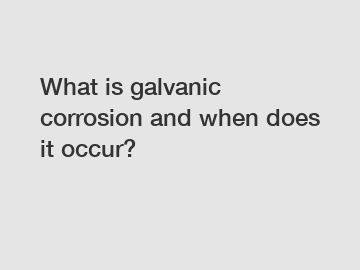What is galvanic corrosion and when does it occur?
Galvanic corrosion occurs when two dissimilar metals come into contact with each other in the presence of an electrolyte. This electrochemical process results in the corrosion of the less noble metal, while the more noble metal remains relatively unaffected.
When two different metals are connected, they form a galvanic cell. The electrolyte in the environment provides the necessary ions for the electrochemical reaction to take place. In this cell, one metal acts as the anode, where oxidation occurs, and the other metal acts as the cathode, where reduction takes place. This leads to the flow of electrons from the anode to the cathode, causing the anode to corrode.
To better understand this phenomenon, let's consider an example of a steel bolt securing an aluminum plate. When these two metals come into contact, an electrolyte such as moisture or saltwater can facilitate the galvanic corrosion process. Since aluminum is less noble than steel, it becomes the anode and undergoes oxidation. The steel acts as the cathode, attracting the electrons from the aluminum ions. Over time, this corrosion process weakens the aluminum, leading to the formation of pits, cracks, and ultimately, structural failure.

The significance of understanding galvanic corrosion lies in its potential impact on various industries. In engineering and construction, the use of dissimilar metals in structures or machinery, such as bridges or boats, can accelerate corrosion and compromise their integrity. This knowledge allows engineers to choose appropriate materials or use protective measures to prevent galvanic corrosion, such as isolating dissimilar metals with insulating materials or employing sacrificial anodes.
Galvanic corrosion also has implications in the automotive industry where different metals are used in the construction of cars. The electrical conductivity of the metals may impact the proper functioning of electronic components, leading to system failures or safety hazards. Recognizing the potential for galvanic corrosion assists in designing efficient grounding systems and avoiding material combinations that are prone to this type of corrosion.
In conclusion, galvanic corrosion occurs when dissimilar metals are in contact with each other in the presence of an electrolyte. By understanding the nature of galvanic corrosion, engineers and industries can make informed decisions regarding material selection and implement appropriate preventive measures. This knowledge ultimately helps ensure the longevity and reliability of various structures, machinery, and systems.
For more forged pipe fittings, pipeline casing, launcher and receiverinformation, please contact us. We will provide professional answers.
212
0
0


Comments
All Comments (0)